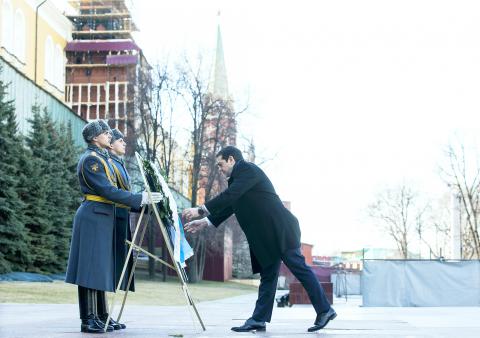Greek Prime Minister Alexis Tsipras was to meet Russian President Vladimir Putin in Moscow yesterday as part of an eye-catching visit that has fueled EU fears that cash-strapped Athens is cosying up to Russia.
The two-day trip comes as Tsipras is battling to unblock a rescue package from the EU and IMF, with some in Brussels warning against any move to barter financial support from Moscow for political backing over the Ukraine crisis.
However, analysts say that while the visit might see Moscow lift an embargo on Greek fruit, overall it is more about political grandstanding aimed at pressuring Europe, rather than a serious shift in policy.

Photo: Reuters
Tsipras, a former communist who came to power in January, has made no secret of seeking closer ties to Russia at a time when Moscow is at loggerheads with the EU over the conflict in Ukraine.
The Greek prime minister — who traveled to Moscow last year prior to his election win — is taking part in a wreath-laying ceremony at the Tomb of the Unknown Soldier by the Kremlin ahead of his sit-down with Putin.
A number of Greek officials have broached the prospect of Athens turning to Russia or China for financial assistance if loan talks with the EU end in failure.
Germany on Tuesday angrily labeled a call by Athens for more than 278 billion euros (US$300 billion) in World War II reparations as “dumb.”
Ahead of the trip, Tsipras once again rattled the EU’s already shaky stance over Ukraine by lashing out at Western sanctions against Moscow as “a road to nowhere.”
“We do not agree with sanctions,” Tsipras told Russian state news agency TASS. “I support the point of view that there is a need for a dialogue and diplomacy, we should sit down at the negotiating table and find the solutions to major problems.”
Russian Minister of Foreign Affairs Sergei Lavrov yesterday said that Moscow wanted to see all EU countries make choices according to their own “national interests” and not “false principles of solidarity.”
Both sides have talked up the possibility of closer economic ties between the two Christian Orthodox nations ahead of the visit — set to be followed by another trip to Moscow for Tsipras for World War II victory anniversary commemorations next month.
Prominent among the issues on the agenda is gas.
However, while both sides make positive noises, there appears no chance of Russia — battling an economic crisis of its own — stepping in with major financial aid.
“There is no question of Greece receiving any money to plug its holes,” Russian foreign affairs expert Fyodor Lukyanov said.
However, Moscow could well decide to revoke a painful embargo on fruit — imposed as part of a wider ban on Western products in response to sanctions over Ukraine — that has bruised Greece’s agricultural sector.

US President Donald Trump yesterday announced sweeping "reciprocal tariffs" on US trading partners, including a 32 percent tax on goods from Taiwan that is set to take effect on Wednesday. At a Rose Garden event, Trump declared a 10 percent baseline tax on imports from all countries, with the White House saying it would take effect on Saturday. Countries with larger trade surpluses with the US would face higher duties beginning on Wednesday, including Taiwan (32 percent), China (34 percent), Japan (24 percent), South Korea (25 percent), Vietnam (46 percent) and Thailand (36 percent). Canada and Mexico, the two largest US trading

ACTION PLAN: Taiwan would expand procurement from the US and encourage more companies to invest in the US to deepen bilateral cooperation, Lai said The government would not impose reciprocal tariffs in retaliation against US levies, President William Lai (賴清德) said yesterday, as he announced five strategies to address the issue, including pledging to increase Taiwanese companies’ investments in the US. Lai has in the past few days met with administrative and national security officials, as well as representatives from various industries, to explore countermeasures after US President Donald Trump on Wednesday last week announced a 32 percent duty on Taiwanese imports. In a video released yesterday evening, Lai said that Taiwan would not retaliate against the US with higher tariffs and Taiwanese companies’ commitments to

CHIP EXCEPTION: An official said that an exception for Taiwanese semiconductors would have a limited effect, as most are packaged in third nations before being sold The Executive Yuan yesterday decried US President Donald Trump’s 32 percent tariff on Taiwanese goods announced hours earlier as “unfair,” saying it would lodge a representation with Washington. The Cabinet in a statement described the pledged US tariffs, expected to take effect on Wednesday next week, as “deeply unreasonable” and “highly regrettable.” Cabinet spokeswoman Michelle Lee (李慧芝) said that the government would “lodge a solemn representation” with the US Trade Representative and continue negotiating with Washington to “ensure the interests of our nation and industries.” Trump at a news conference in Washington on Wednesday announced a 10 percent baseline tariff on most goods

‘SPECIAL CHANNEL’: Taipei’s most important tasks are to stabilize industries affected by Trump’s trade tariffs and keep negotiations with Washington open, a source said National Security Council Secretary-General Joseph Wu (吳釗燮) arrived in the US for talks with US President Donald Trump’s administration, a source familiar with the matter said on Friday. Wu was leading a delegation for a meeting known as the “special channel,” the Financial Times reported earlier. It marked Trump’s first use of the channel since returning to the White House on Jan. 20. Citing a source familiar with the matter, the Financial Times reported that Minister of Foreign Affairs Lin Chia-lung (林佳龍) was also a part of the delegation. The visit came days after China concluded war games around Taiwan and amid Trump’s